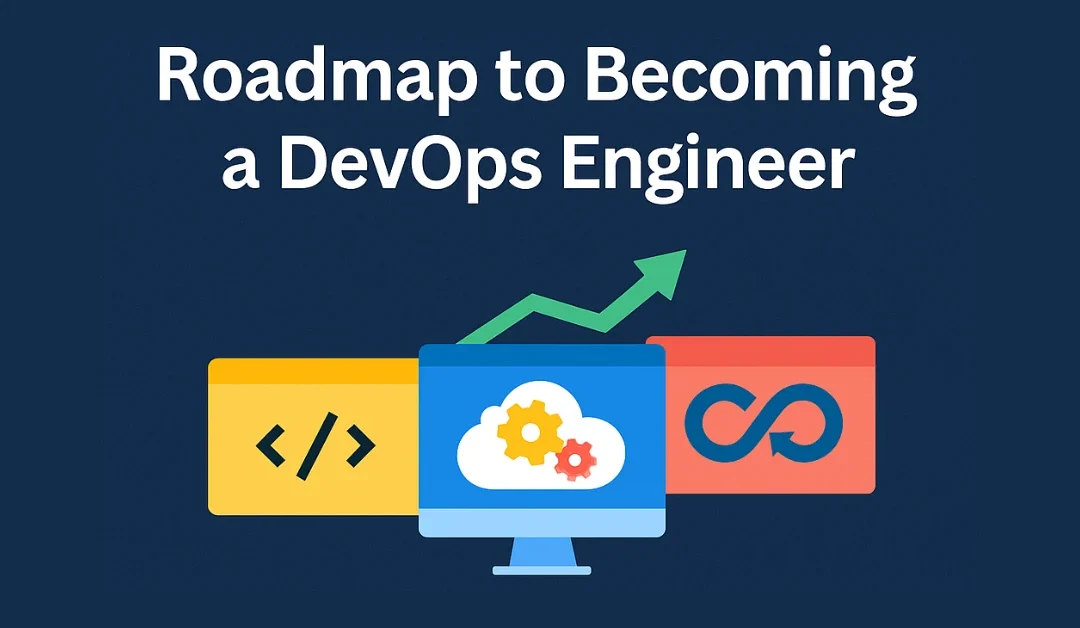In today’s fast-paced tech world, DevOps is no longer just a buzzword — it’s a career-defining skill set. With businesses moving toward automation, cloud infrastructure, and continuous delivery, DevOps engineers are in high demand.
If you’re aspiring to become a DevOps professional, this step-by-step roadmap will guide you from beginner to job-ready. Whether you prefer DevOps training in Indore or DevOps online training, the journey is the same — but the right training will help you get there faster.
Step 1: Understand What DevOps Really Means
Before jumping into tools and technologies, understand the DevOps culture. DevOps is a collaboration between software development (Dev) and IT operations (Ops) to deliver applications faster, more reliably, and with fewer issues. It’s about automation, continuous integration, continuous delivery (CI/CD), and monitoring.
Pro Tip: Read case studies on companies implementing DevOps to see the real-world benefits.
Step 2: Master the Fundamentals of Operating Systems and Networking
A DevOps engineer must understand how systems work at a low level:
- Linux basics: Command-line navigation, file permissions, shell scripting
- Networking fundamentals: DNS, HTTP, IP, firewalls, load balancing
If you’re new to Linux, LTS Indore offers foundational Linux training as part of our DevOps curriculum, ensuring you’re comfortable with server environments.
Step 3: Learn Version Control (Git & GitHub)
Version control is a must-have skill for managing code and collaborating with teams. Git allows you to track changes, revert to previous versions, and work with multiple developers.
Focus on:
- Creating repositories
- Branching and merging
- Pull requests and code reviews
Step 4: Get Hands-On with Scripting & Programming
While you don’t have to be a full-time programmer, knowing at least one scripting or programming language will make automation easier.
- Python is highly recommended for its simplicity and DevOps tool integration.
- Shell scripting for quick automation tasks.
Step 5: Understand Continuous Integration & Continuous Delivery (CI/CD)
CI/CD is the heart of DevOps. You’ll need to know how to set up pipelines that automatically build, test, and deploy applications.
Popular CI/CD tools include:
- Jenkins
- GitLab CI
- GitHub Actions
During DevOps online training, you’ll practice building end-to-end CI/CD pipelines to automate deployments.
Step 6: Learn Configuration Management Tools
Configuration management helps you maintain server setups across multiple environments. Tools like:
- Ansible
- Puppet
- Chef
These tools ensure that your infrastructure remains consistent and error-free, no matter how many servers you manage.
Step 7: Dive into Containers & Orchestration
Containers make applications portable, and orchestration helps you manage them at scale.
- Docker: Learn how to containerize applications.
- Kubernetes: Understand how to deploy and manage container clusters.
Step 8: Master Cloud Platforms
Almost all modern DevOps workflows are cloud-based. The most in-demand skills include:
- AWS (Amazon Web Services) — EC2, S3, IAM, VPC, CloudFormation
- Azure or Google Cloud — optional, but beneficial
Our DevOps training in Indore includes AWS cloud modules, giving you hands-on experience in deploying cloud-native applications.
Step 9: Learn Infrastructure as Code (IaC)
IaC allows you to manage infrastructure using code rather than manual processes. Terraform is the most popular tool for IaC and is a must-learn for modern DevOps engineers.
Step 10: Implement Monitoring & Logging
Monitoring helps you detect issues before they impact users.
- Prometheus and Grafana for metrics visualization
- ELK Stack (Elasticsearch, Logstash, Kibana) for log management
Step 11: Work on Real-World Projects
Theory alone isn’t enough — employers want proof of hands-on experience. Create projects such as:
- A CI/CD pipeline for a sample web app
- A containerized microservices setup in Kubernetes
- Automated AWS infrastructure deployment with Terraform
These projects will make your portfolio stand out during job applications.
Step 12: Prepare for Interviews & Certification
Certifications can help validate your skills:
- AWS Certified DevOps Engineer
- Docker Certified Associate
- Kubernetes Certified Administrator (CKA)
Practice problem-solving scenarios and keep learning — DevOps is a fast-evolving field.
Why Choose LTS Indore for DevOps Training?
At LTS Indore, we provide a structured, hands-on curriculum for both DevOps training in Indore and DevOps online training. You’ll learn from industry experts, work on live projects, and gain practical skills that employers value.
We cover:
- Linux fundamentals
- AWS cloud integration
- Docker & Kubernetes
- CI/CD pipelines
- Monitoring tools
Whether you’re in Indore or anywhere in the world, we’ll guide you step-by-step toward becoming a skilled DevOps engineer.
Final Thoughts
Becoming a DevOps engineer is not about rushing through tools — it’s about building a solid foundation and consistently improving your skills. By following this roadmap and taking quality training, you can secure a high-demand career in DevOps.
If you’re ready to start, explore our DevOps training in Indore or join our DevOps online training program today.

